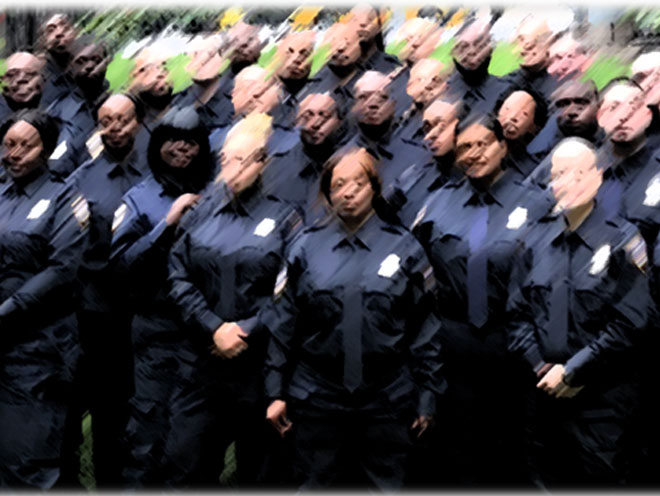
By Thomas Egan, Director of Security and Hospital Police at NYC Health and Hospitals
The term de-escalation has become a trendy ‘buzz-word’ in the media, but these tactics are not new to police work; de-escalation has been around for a long time.

Techniques such as ‘verbal direction’ and ‘verbal judo’ are the foundation for crisis intervention techniques that are available throughout the country and even the world.
What is discussed in programs that contain a focus on de-escalation, such as Preventing and Managing Crisis Situations (PCMS), offered by The New York State Office of Mental Health, The Foundation Course from the Crisis Prevention Institute, Management of Aggressive Behavior, offered by MOAB Training International and others is a formalized plan of intervention that progresses in a manner that is not dissimilar from the defensive tactics training that is a staple of police recruit training.
These techniques mesh easily with police training and should be taught alongside, if not as part of self-defense, arrest tactics, and the proper use of force.
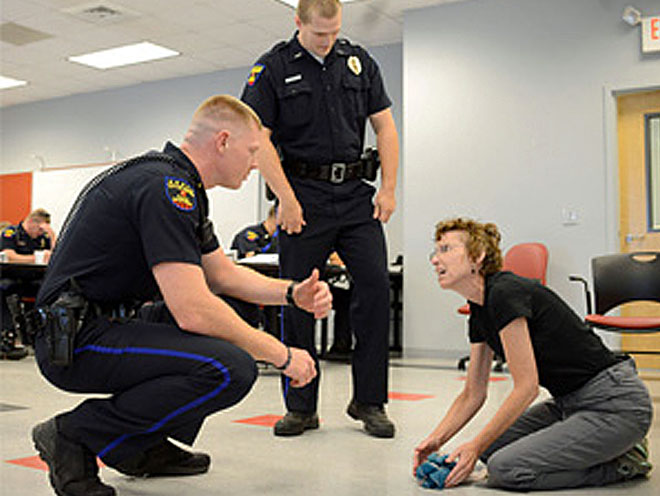
It may even be advisable to teach defensive tactics as crisis intervention to ensure that de-escalation is put in the proper perspective and taken with the seriousness it requires.
Ideally, de-escalation will reduce the need to use force and have the added benefit of dispelling the all too prevalent view of police-as-adversary.
In New York State, recruit training requires instruction in the elements of strong interpersonal and communication skills and the practical application in force to levels of resistance.
Introducing a preventative approach and the ongoing assessments for identifying anxiety, risk behaviors, and triggers while discussing effective ways to protect yourself and others may better prepare officers for the challenges they face.
(Learn More. “Professionally, people see me as a go-to person, that I can handle tough situations well. The only way I’ve been able to stay so calm in crisis situations is through CPI training.” Courtesy of Crisis Prevention Institute and YouTube)
Recognizing that in many instances, the need to reduce tensions and to conduct a post-incident analysis of response will provide an opportunity to learn and improve as they go.
Adding contemporary police philosophies such as the OODA Loop (the decision cycle of observe, orient, decide, and act, developed by military strategist and United States Air Force Colonel John Boyd) may provide the focus on mental agility that will complement the physical abilities being honed with defensive tactics training.
The complex issues facing our police today requires a corresponding evolution in police training to keep pace.

At the heart of every crisis intervention program is the safety of all involved, a principle that meshes well with a police department’s mission statement to protect and serve.
Last week, the New York City Hospital Police Academy graduated another class of recruits; fifty-six new unarmed peace officers are now certified and working throughout the city with the mission of preserving the safety and dignity of all.
During training, we focus on dignity as intently as safety, because people do not riot in the streets when their safety is threatened.
When their safety is threatened, they hide behind locked doors.
When a person feels their dignity is not respected, predicting how they’ll respond is difficult at best.
History shows resistance may be extreme. Lost or threatened dignity may result in intense defiance and extreme violence.
(We believe that empathy deepens perception. It isn’t always easy to be empathetic, but empathy is key to providing the compassionate, person-centered care that everyone deserves. Courtesy of the Crisis Prevention Institute and YouTube)
Our new officers (experienced ones as well) are responsible for keeping calm under volatile and sometimes dangerous conditions.
We insist that our peace officers are not the persons responsible for escalating any situation.
We protect highly trained clinicians and support staff so they are able to provide care and assistance; when asked to assist or intervene, our officers are trained to do so in as minimally invasive a way as possible.
This approach is in line with contemporary healthcare values.
(The nurse who was stabbed several times at Harrington Hospital has been identified. Courtesy of CBS Boston and YouTube. Posted on Jun 15, 2017)
Clear communication is the order of the day and resolves most concerns and potential conflicts.
Hospital Police are trained to treat all requests for assistance as crisis intervention.
This does not mean each interaction will result in clinical or medical treatment, but our approach, whether clinical or custodial, should be similar.
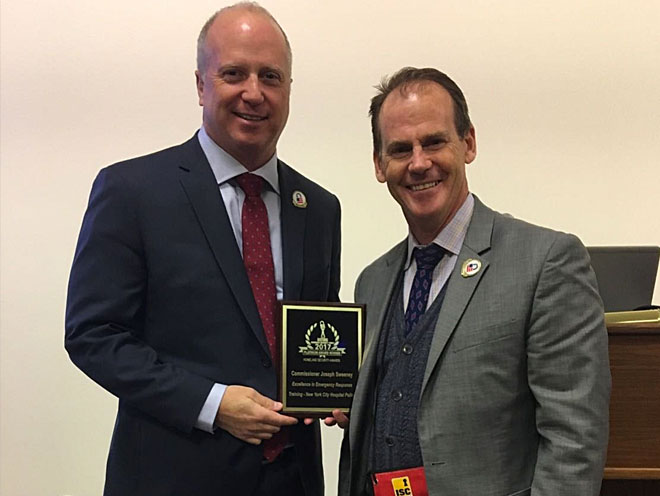
We train to approach each intervention as a call for assistance.
In doing so, we keep the values of the organization at the forefront.
This approach is not aggressive or antagonistic, although a peace officer must be prepared to deal with such behavior.
In reviewing our curriculum, our test scores and recruit feedback, we are confident that these officers are as well-prepared as any who have come before.
By focusing on crisis intervention, we acknowledge that times are changing and those of us in police service need to change with them.
2017 ‘ASTORS’ Homeland Security Awards Recognition
Commissioner Joseph Sweeney, Deputy Commissioner Thomas Egan and the New York City Hospital Police have been recognized for “Excellence in Government” for their Innovative Emergency Response Training by American Security Today in the 2017 ‘ASTORS’ Homeland Security Awards Program at ISC East, which was held in the Jacob Javits Convention Center on November 15th.
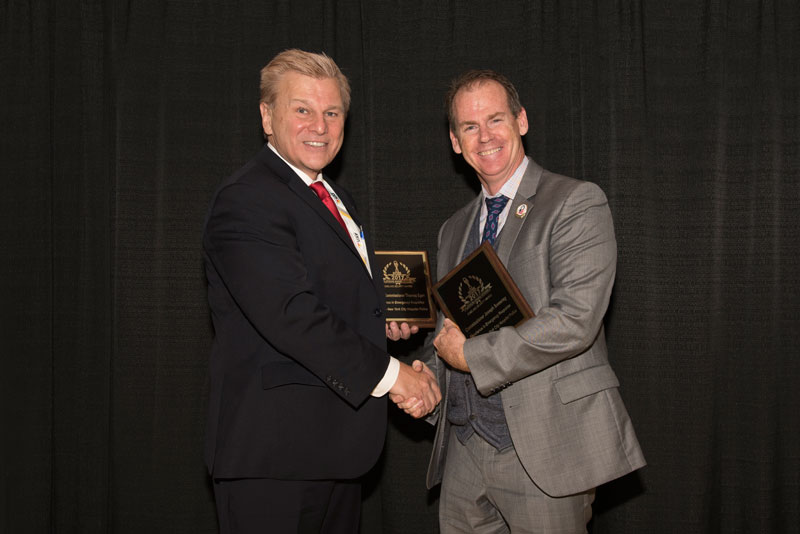
Commissioner Sweeney, Deputy Commissioner Egan and Lieutenant Jose Semorile represented the NYHP to accept the awards, and were joined by over 100 Top Government Officials and Industry Leading Firms from across North America and the Middle East in acknowledgment of their Outstanding Training and Product Development Achievements and Exciting New Technologies to address the evolving homeland security threats our Nation is facing.
American Security Today’s comprehensive Homeland Security Awards Program was organized to recognize the most distinguished vendors of Physical, IT, Port Security, Law Enforcement, and First Responders, in acknowledgment of their outstanding efforts to ‘Keep our Nation Secure, One City at a Time.’
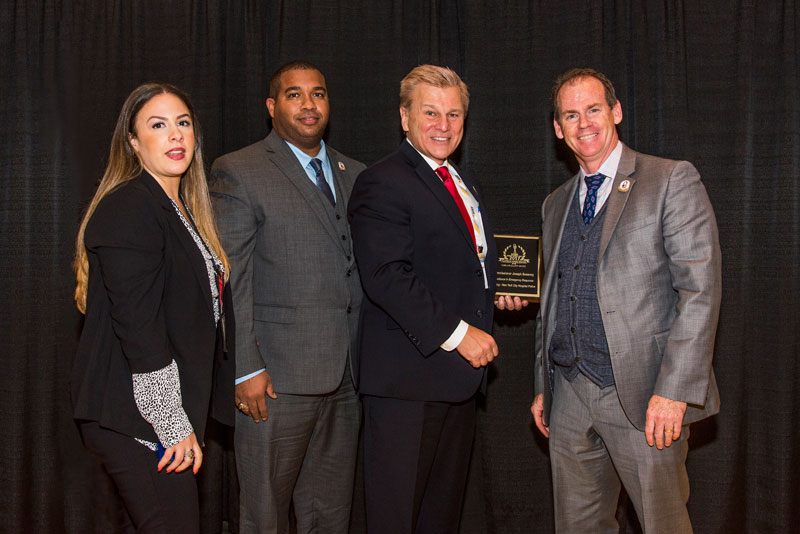
Congratulations to the Hospital Police at NYC Health and Hospitals on your Achievements and Thank You for all you do to keep our Critical Healthcare Facilities safe for staff, patients, your team and our nation’s citizens.
The Hospital Police at NYC Health and Hospital is a law enforcement agency in New York City whose duties are to provide on-site security services at hospitals and clinics operated by the New York City Health and Hospitals Corporation (HHC) and to enforce state and city laws at those facilities and exciting new technologies to address the growing homeland security threats our Nation is facing.
(Courtesy of the New York Hospital Police PBA, Clark Pena and YouTube)
















